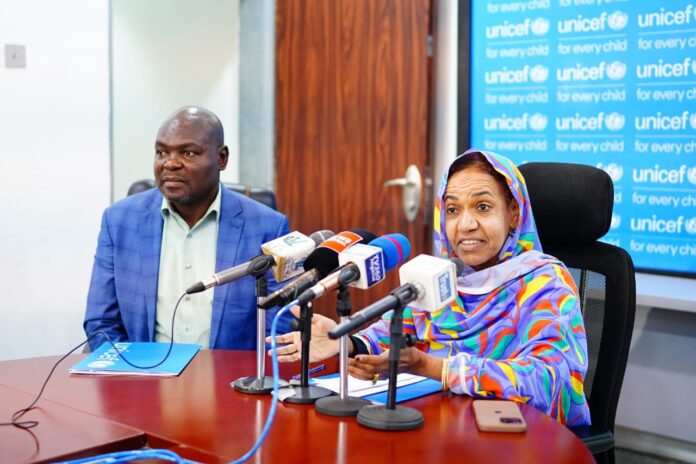By Ahmed Liman Kingimi Maiduguri
During her visit to Maiduguri on August 28, 2025, UNICEF Nigeria Country Representative Wafaa Elfadil Saeed Abdelatef emphasized the critical situation facing children in Nigeria’s northeastern region. She highlighted her first official visit to Borno, underscoring the importance UNICEF places on the Northeast’s children and families.
Expressing admiration for Governor Zulum and his government, Abdelatef praised their leadership amid one of the world’s most challenging environments. “In one of the most difficult places on earth, the resilience and professionalism of Borno’s leadership are remarkable,” she stated. “UNICEF remains fully committed to partnering with the government to improve the lives of children and families across Borno and the entire Northeast.”
Over her two-day visit, Abdelatef toured health centers, schools, and displacement camps, witnessing firsthand the devastating impact of the ongoing crisis. She recounted meeting a young girl in a camp who shared that displacement had stolen her childhood. “Behind every statistic is a child like her—living in fear but still holding onto hope,” she said.
The humanitarian crisis in Nigeria’s Bay States—Borno, Adamawa, and Yobe—remains severe, with over 4.5 million people in urgent need of aid, half of them children. In these states, 2.5 million children are at risk of severe acute malnutrition, as families struggle with food shortages, and health facilities report children wasting away. Mothers often arrive at feeding centers with critically ill infants, highlighting the urgent need for intervention.
Between January and June 2025, UNICEF and partners have made significant strides, reaching 1.3 million people with health services, treating 340,000 children for severe malnutrition, providing safe water to 185,000 individuals, and supporting over half a million out-of-school children to return to classrooms. However, Abdelatef warned that the needs continue to outpace response efforts, calling for increased support from all sectors.
Addressing these challenges, she identified Nigeria’s nutrition, education, and immunization as top priorities. “Nigeria is home to 15 million malnourished children under five, with 3.5 million at risk of severe acute malnutrition,” she noted. “If we do not act now, 420,000 children could die this year alone. We must urgently invest in nutrition—more funding, local food solutions, and scaling up treatment centers—so no child dies due to malnutrition.”
The education crisis also demands urgent attention, Abdelatef explained. “Eighteen point three million Nigerian children are out of school—nearly one in three. Many fail to complete primary or secondary education, and only 27% of children aged 7-14 can read with comprehension. Education is Nigeria’s greatest opportunity for transformation,” she emphasized. She called for increased investment in qualified teachers, more classrooms, and improved learning quality.
On immunization, Abdelatef highlighted alarming gaps. “Nigeria has over 2.1 million zero-dose children—the highest in the world—leaving many exposed to preventable deadly diseases,” she said. “Children who are wasted and unvaccinated are up to 12 times more likely to die. We must prioritize immunization and primary health care to reach every child, regardless of location.”
Concluding her remarks, Abdelatef reaffirmed UNICEF’s focus on three key areas: bringing children back to school, ensuring adequate nutrition, and expanding immunization. “Success in these areas can transform millions of lives and secure Nigeria’s future,” she affirmed.
She also outlined other critical priorities, including combating child protection issues like female genital mutilation (FGM), promoting birth registration, tackling climate change impacts, providing safe water and hygiene, and strengthening social protection systems for vulnerable families.
“Together, we can make a difference,” Abdelatef concluded, calling for urgent action from government, partners, and donors to meet these pressing challenges.
—END—




